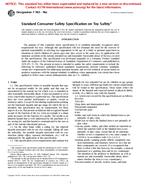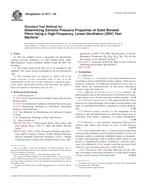1.1 This test method covers determination of the dynamic elastic properties of isotropic and near isotropic carbon and graphite materials at ambient temperatures. Specimens of these materials possess specific mechanical resonant frequencies that are determined by the elastic modulus, mass, and geometry of the test specimen. The dynamic elastic properties of a material can therefore be computed if the geometry, mass, and mechanical resonant frequencies of a suitable (rectangular or cylindrical) test specimen of that material can be measured. Dynamic Young’s modulus is determined using the resonant frequency in the flexural or longitudinal mode of vibration. The dynamic shear modulus, or modulus of rigidity, is found using torsional resonant vibrations. Dynamic Young’s modulus and dynamic shear modulus are used to compute Poisson’s ratio.
Product Details
- Published:
- 10/01/2016
- Number of Pages:
- 16
- File Size:
- 1 file , 370 KB
- Redline File Size:
- 2 files , 820 KB


